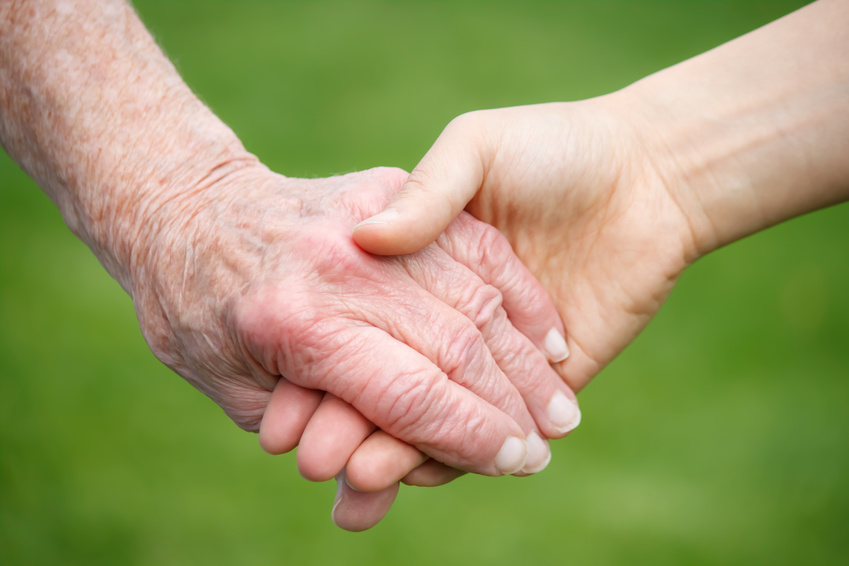 My father died on Thanksgiving 18 years ago in a hospital decorated with orange crepe paper streamers and cardboard images of pilgrim hats and turkeys. He was two weeks shy of 93, but had been active and alert until he was 90. My mother had died 30 years before, and Dad had remained a bachelor until he met the right woman again—when he was 85. He was in his eighties when his doctor diagnosed a slow-growing prostate cancer and told him that, frankly, he would die of other causes before the cancer would get him. The doctor didn’t know Dad would live so long and succumb to the cancer in the end.
My father died on Thanksgiving 18 years ago in a hospital decorated with orange crepe paper streamers and cardboard images of pilgrim hats and turkeys. He was two weeks shy of 93, but had been active and alert until he was 90. My mother had died 30 years before, and Dad had remained a bachelor until he met the right woman again—when he was 85. He was in his eighties when his doctor diagnosed a slow-growing prostate cancer and told him that, frankly, he would die of other causes before the cancer would get him. The doctor didn’t know Dad would live so long and succumb to the cancer in the end.
Because my father was a hypochondriac his entire life, I had begun, as a child, to tune out his numerous and assorted kvetches. (As he aged, of course, the complaints became legitimate.) The sad joke was that my father, always worried about his health, lived so long while my mother died at 56.
But he can’t be reduced to anxieties and fears. He loved to travel by subway around New York and never hesitated to schlep laundry or groceries. He was a joke teller, a great ballroom dancer, a bass who sang in local shows and, pardon the non-kosher expression, hammed up the HaMotzi blessing over bread at every wedding and bar mitzvah. It was understood that Uncle Morris always had that privilege. Whenever you left a restaurant with my father, certain he was right behind you, you would find him lagging behind, kibitzing with the waiters or waitresses. He gave the people he knew nicknames and called strangers either Chief or Dolly, depending upon the gender. He lied about his age so that he could keep working into his seventies. As my older son said at the funeral, “Grandpa, that box can’t hold you.”
Dad wouldn’t move from the Bronx apartment he’d lived in for over 40 years. The neighborhood changed from Jewish and Irish to Latino and Asian, and he made friends with everyone and learned some Spanish. I was depressed every time I visited, seeing how shabby the place was, but my father wouldn’t budge. He scoffed at suggestions he relocate to New Jersey, where his wife’s daughter lived, maintaining that you go there after you die because that’s where he had burial plots. And then he’d ask (for the millionth time) if we knew about the cemetery that was so popular. No? Wait a beat. “I heard people were dying to get in.”
His last day was spent in the hospital across the street from his apartment —a kind of second home to him over the years. My sister and her family arrived (under other circumstances they would have driven the three hours to my house for Thanksgiving dinner, not to the hospital), and we all gathered around his bedside instead of around the table. He was on heavy-duty meds, yet seemed agitated, so I took his hand and told him not to be afraid, that he would see all of the people he had lost and still missed so desperately—his parents, my mother, his sister—that it was okay. I guess I lied. It wasn’t okay and he knew it. “Never kid a kidder” was one of his sayings. And then the awful rattle in the throat and he stopped breathing.
Efficiently, compassionately, the hospital staff took over. We all stumbled into the waiting room. A nurse passing by, unaware of what had just happened, called in cheerily to us, “Happy Thanksgiving!”
I don’t remember the rest of that day. Grief causes amnesia. Did we call the relatives—spoiling their Thanksgiving? I do know we did have Thanksgiving dinner the next day. Or maybe the day after. Dad, who had lived through the Depression and World War II rationing would have hated for all that food to go to waste. So we ate, although we weren’t feeling very thankful.
But I can’t say Thanksgiving has been ruined for me. My father had a long life and enjoyed it almost up until the very end. I think about him, and write about him, very often. I see so much of him in myself. My less happy memories of him have faded, replaced by the many positives ones. I remember that his favorite part of the turkey was the drumstick.

